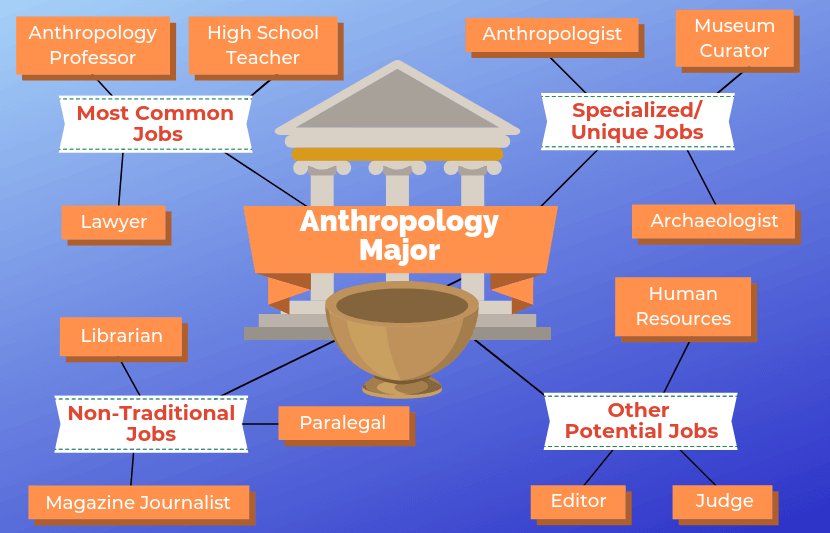Overview of Jobs with an Anthropology Bachelor’s Degree
Jobs with an anthropology bachelor’s degree – An anthropology bachelor’s degree opens doors to a wide range of career options, encompassing various industries and sectors. Graduates with this degree can find employment in fields such as research, education, museum studies, cultural resource management, and international development.
Specific job titles that anthropologists may hold include:
- Cultural Anthropologist: Studies human cultures and societies, focusing on their beliefs, customs, and social organization.
- Archaeologist: Excavates and analyzes archaeological sites to uncover the past and human history.
- Museum Curator: Manages and preserves artifacts and collections in museums and cultural institutions.
- Cultural Resource Manager: Ensures the preservation and protection of cultural resources, such as historical sites and artifacts.
- International Development Specialist: Works in developing countries to improve living conditions and promote sustainable development.
Skills and Qualifications Required
Employers seek anthropology graduates with a solid foundation in the discipline, including knowledge of cultural theory, research methods, and analytical skills. Specific skills and qualifications that are highly valued include:
- Strong analytical and critical thinking abilities
- Excellent communication and writing skills
- Cultural sensitivity and understanding
- Research design and implementation expertise
- Data collection and analysis proficiency
An anthropology bachelor’s degree equips graduates with these essential skills through a combination of coursework, fieldwork, and research projects.
Specializations and Concentrations
Within anthropology bachelor’s degree programs, students can often choose from various specializations or concentrations to enhance their career prospects and prepare for specific career paths. These specializations may include:
- Cultural Anthropology: Focuses on the study of human cultures and societies.
- Archaeology: Emphasizes the excavation and analysis of archaeological sites.
- Biological Anthropology: Explores human evolution, genetics, and primatology.
- Linguistic Anthropology: Studies the structure and use of human language.
- Applied Anthropology: Applies anthropological knowledge and methods to solve real-world problems.
Each specialization offers unique career opportunities, such as working in museums, archaeological research institutions, or development organizations.
Career Advancement and Growth
Individuals with an anthropology bachelor’s degree have the potential for significant career advancement and growth. They can pursue various career paths, including academia, research, government, and non-profit organizations. Opportunities for professional development abound, such as attending conferences, publishing research, and pursuing advanced degrees.
Factors that contribute to career growth include:
- Strong work ethic and dedication
- Networking and professional connections
- Continuous learning and skill development
- Specialization in a particular area of anthropology
Related Fields and Interdisciplinary Approaches
An anthropology bachelor’s degree complements well with other fields, creating unique career opportunities. Interdisciplinary approaches that combine anthropology with other disciplines include:
- Medical Anthropology: Explores the relationship between culture and health.
- Environmental Anthropology: Examines the interactions between humans and their environment.
- Digital Anthropology: Studies the impact of technology on human cultures.
- Urban Anthropology: Focuses on the study of urban environments and their social dynamics.
Interdisciplinary programs and research projects demonstrate the versatility of an anthropology degree, allowing graduates to pursue careers in various fields.
Wrap-Up

An anthropology bachelor’s degree provides a solid foundation for a fulfilling and rewarding career in diverse fields. Graduates are empowered to make meaningful contributions to society by leveraging their knowledge and skills to address complex social issues and promote cultural understanding.
Questions Often Asked
What are the career prospects for anthropology graduates?
Anthropology graduates have a wide range of career options, including roles in academia, research, education, non-profit organizations, government agencies, and private sector companies.
What are the essential skills required for anthropology jobs?
Essential skills for anthropology jobs include critical thinking, analytical skills, cultural sensitivity, research methods, and communication skills.
How does an anthropology bachelor’s degree prepare graduates for the job market?
An anthropology bachelor’s degree provides graduates with a strong foundation in anthropological theories, methods, and research, equipping them with the skills and knowledge necessary to succeed in various career paths.